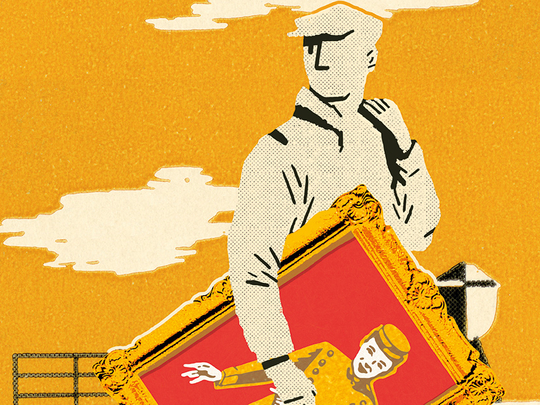
The Fortunate Ones
By Ellen Umansky, Harper Collins, 324 pages, $27
There is often a requisite magic to fiction involving lost masterpieces. Two memorable examples, Donna Tartt’s The Goldfinch and Dara Horn’s The World to Come, use a scaffold of mystery to contain the logic of fairy tales. Something similar holds for stories about music (the film The Red Violin comes to mind, as does David Mitchell’s epic Cloud Atlas). In each of these variations, the masterpiece at the centre serves as a kind of literary baton, passing between different sets of hands, linking divergent fates and disparate eras. At the end we’re left with an overwhelming sense of art’s transcendent nature, its quasi-magical power to wash the dust of daily life off our souls, as the old saying has it.
Ellen Umansky’s first novel, The Fortunate Ones, borrows the architecture of the art mystery, but leaves aside the obligatory magic in favour of a quieter and more earthly examination of how art serves us in the here and now. The lost painting at the heart of the book is The Bellhop, a fictional amalgam of Chaim Soutine’s bellboys and hotel porters. In the eyes of 11-year-old Rose Zimmer, the boy in the painting “was too skinny in his red uniform, his face pasty and elongated. The paint was thick, thrown on ... as if the painter couldn’t be bothered to slow down and pay attention. Rose didn’t understand why her mother loved it so.”
The canvas disappears when the Nazis plunder the Zimmers’s apartment in Vienna after the Anschluss. Rose and her older brother are spared their parents’ brutal fate, escaping to England on the Kindertransport. Sixty-six years later we encounter Rose in Los Angeles, now a chic, no-nonsense woman attending the wake of a friend, Joseph, who acquired her family’s lost Soutine after it mysteriously turned up in New York. But the painting no longer hangs on Joseph’s walls, having disappeared years ago on the night his rebellious daughter Lizzie threw a wild party in his absence. Lizzie, now 37 and at a crossroads in life, meets Rose at Joseph’s funeral, and feels a powerful affinity. As the two grow closer, Rose permits Lizzie to reopen the case of the lost painting.
Often in historical fiction the character who is haloed in history is the one who feels more urgent and real than her present-day counterpart. This may be simply because the “historical” character is carving a path forward, while the present-day one keeps returning to the past. Both Rose and Lizzie feel a burden of guilt towards their departed parents: Lizzie for her ingratitude towards Joseph’s belated attempts to be a good father, and Rose for failing to find jobs for her parents in Britain, so that they too could escape Vienna. Umansky captures the stubbornness of childhood guilt, the way it can haunt later in life, even as the adult recognises the limits of the child’s power. Years earlier, when Joseph offered to buy Lizzie a work of art on her birthday, she thwarted him by demanding something that wasn’t for sale, a derivative Arbus-like photograph that included a child clutching a toy grenade (which Joseph nonetheless maneuvered to get her). Now an orphan in her 30s, she yearns for a kind of initiation into adulthood that connoisseurship can bring — the pride and humility of appreciation, which her father tried but failed to instill in her.
The lessons Lizzie seems desperate to learn we watch Rose learning, six decades earlier, in a Russian literature course in college. In the Russians, she discovers a comforting resonance with “the ugliness of the human condition” and “unavenged suffering.” Rose’s girlfriends, fellow refugees who attend class to find husbands, mock her for taking her studies so seriously. “But here was the trick,” Umansky writes. “Rose didn’t care. She felt a small but heady rush; Rose knew what she wanted, and what she wanted was tantalisingly, incredibly hers.” Unlike her extroverted brother, Rose never feels truly at home among the English. Finally comprehending the magnitude of her loss, she senses that through literature and art she can make uneasy peace with her fundamental aloneness.
On occasion, the novel falls into its own aesthetic traps. The dialogue sometimes feels too cinematically coy, and there is a veneer of politeness to the prose even in moments of conflict. But the ideas at its core are deceptively deep. The Fortunate Ones is a subtle, emotionally layered novel about the ways art and other objects of beauty can make tangible the invisible, undocumented moments in our lives, the portion of experience that exists without an audience but must be preserved if we are to remain whole. There is a scene that’s easy to miss in which Lizzie admires a picture hanging over Rose’s armchair: a framed stretch of silk decorated with a pattern of birds in flight. Rose informs her that this is the scarf her mother gave her before saying goodbye. By giving this symbol of her loss a permanent place, Rose shows Lizzie, and the reader, that connoisseurship isn’t always about bringing art’s magic into our lives, but about what we choose to give a frame.
–New York Times News Service
Sana Krasikov is the author of The Patriots.









